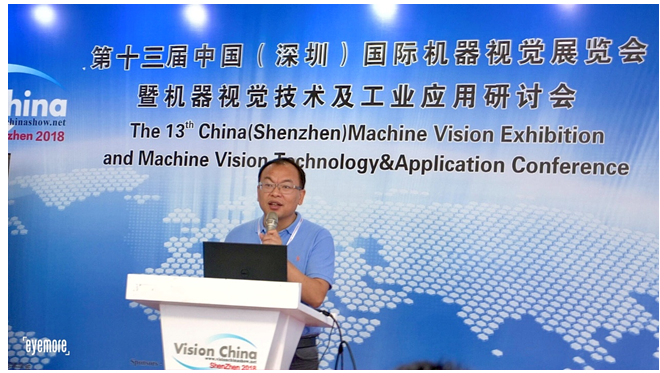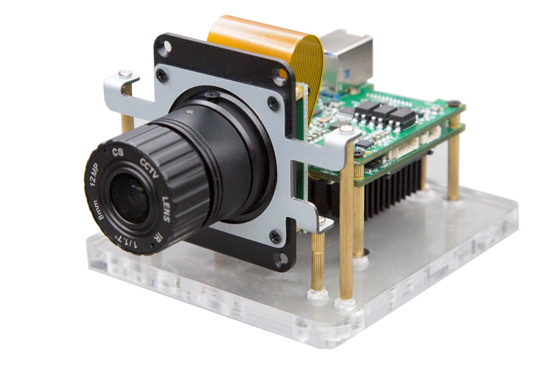As one of the stops of China (International) Machine Vision Exhibition, China (Shenzhen) Machine Vision Exhibition and Seminar on Machine Vision Technology and Industrial Application was held in Shenzhen Convention and Exhibition Center from June 27th to 29th. The exhibition was organized by China Machine Vision Industry Alliance.
China (International) Machine Vision Exhibition is regarded as the largest, most professional and authoritative international machine vision industry event in China. The first stop was successfully held in Shanghai in March this year, and will be held in Beijing in October.
As the representative of the new power of machine vision and the upstart of AI chip in China, Elysee Technology, together with hundreds of well-known enterprises in the field of machine vision at home and abroad, such as OPT, American Filar, Micro View Image, Suo You Technology and Daheng Image, took part in the exhibition.

Zhu Jizhi, founder and CEO of Eye-Qing Technology
At the same time, at the invitation of the organizer, Jizhi Zhu, founder and CEO of Eyemore Technology, attended the machine vision technology and industrial application seminar on June 28, and gave a speech titled "Eyemore Imaging Engine: "Zero threshold DIY machine vision camera" keynote speech, the conference released the "light tamer" series camera, for the machine vision industry to provide high-end customization solutions, including "light tamer" machine vision camera series, standardized machine vision camera module, professional high-end deep customization services. The keynote of the speech by Zhu Jizhi, CEO of Eye-Qing Technology, is as follows:
Machine vision "three musketeers" came into being
At present, all the ISP systems of machine vision in China are derived from Japanese digital cameras in the 1990s. The biggest problem is that the computing power is very poor, unable to cope with the complex and changeable light environment. With the advent of the era of AI, new requirements have been put forward for visual imaging. Intelligent security, automatic driving, robotics and other fields require machine vision to be able to accurately image in all weather and various complex environments.
According to Elylook, traditional ISP architectures are not adaptive to complex lighting. To this end, in January this year, EyeMotion launched the world's first self-developed imaging chip for complex light, Eyemorex42. In April of the same year, EyeMotion X120, China's first ultra-wide dynamic autonomous driving vision imaging program, was released.

Eye - lift technology "light tamer" series sample
The new Light Tamer is powered by the Eyemore imaging engine. Among them, the "trainer" light machine vision series according to the industrial standard custom, contains the L series (low intensity of illumination), D (super wide dynamic), G series (global exposure), and H series (super beautiful colour), USES the C/CS standard lens, with a dynamic range of the highest is 120 db, close to the dynamic range of the human eye level.

Standardized machine vision camera modules are mainly for customers who need to make their own industrial cameras due to a variety of needs. There are three parts in the module. The front is the Sensor board of a Sensor, the bottom is the main board of the imaging engine, and the top is the interface board.
Zhu said that the product already supports more than 20 sensors with good performance, and will support 30-50 sensors in the next year.

Professional high-end and deep customization services are mainly aimed at customers who have higher requirements for cameras or imaging and need customization in the era of AI.
Zhu Jizhi said that these services support any system customization of CMOS, any structure and size customization, image parameters can also be customized, including frame rate, exposure, Global Shutter, dynamic range, resolution, etc. At the same time, customization also includes interfaces such as coaxial, optical fiber, and control interfaces such as API interaction.
According to Zhu, the service is available because EyeTech has a fully independently developed imaging engine platform, which is one of EyeTech's core technical advantages.
AI era, the development trend of machine vision: faster, higher, stronger
Influenced by artificial intelligence, with the in-depth promotion of "Made in China 2025", China's manufacturing industry is gradually transforming to intelligence and entering the fast track of development, and the demand for machine vision is also growing day by day. According to statistics, by 2020 the global market size will reach 12.5 billion US dollars, and China has become the third largest machine vision market in the world after the United States and Japan.
Zhu Jizhi also believes that machine vision will develop very fast in the next few years due to the influence of AI, which is not only a good opportunity, but also a big challenge. On the one hand, they may have more resources and better technology. On the other hand, the participation of more people will also promote the landing of the industry as soon as possible.
At the same time, in the era of AI, there will be a steady stream of new customized and high-end products or demands in the field of machine vision. In addition, in the age of AI, customers want their products to have greater visual capabilities. Zhu revealed that he has a customer to make a high-precision 3D scanner, which is used in the e-commerce platform. The product's visual ability is very strong, for example, the color accuracy is very accurate, up to the level of SLR, and the accuracy is also required to be below 30 microns.
Positioning itself as a leader in the next generation of imaging engine technology, Eyeengine aims to complete 500 Design-In for AI vision customers in the fields of autonomous driving, security, medical, 3D scanning and industrial testing in the next three years, occupying more than 50% of the AI visual imaging market.